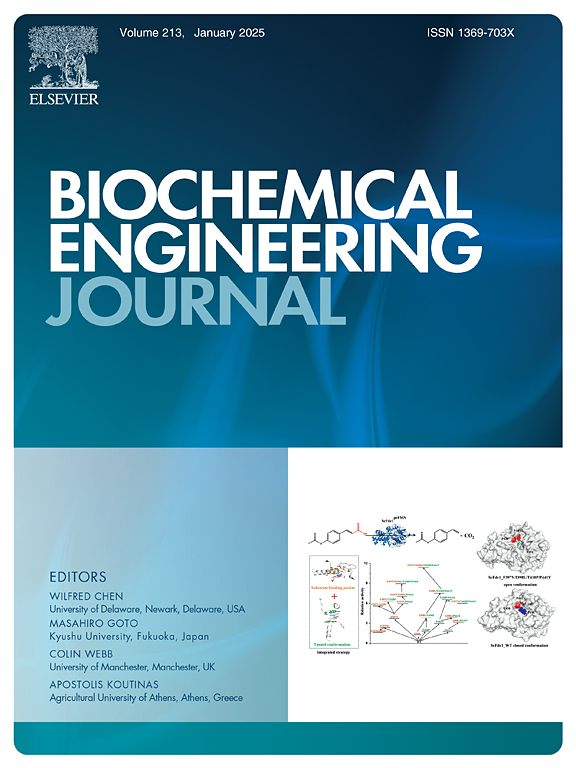Enhanced degradation of petroleum hydrocarbons by immobilizing Acinetobacter
IF 3.7
3区 生物学
Q2 BIOTECHNOLOGY & APPLIED MICROBIOLOGY
引用次数: 0
Abstract
The highly efficient elimination of petroleum pollution is essential for addressing environmental issues and social sustainability. A hydrocarbon-degrading bacterium SHC is isolated from petroleum-contaminated soil in Chengdu, China, to augment bioremediation efforts against crude oil contamination. According to the analysis of 16S rDNA sequences, strain SHC was identified as Acinetobacter. The degradation rate of 2 g/L crude oil by free bacterium reached 30 % within 7 days. Through the analysis of hydrocarbon biodegradation, strain SHC was found to biodegrade more long-chain n-alkanes (C19–C29). Further, we delve into utilizing agar as a microbial immobilization matrix, supplemented with nutrient salts and oil-absorbing materials, to foster the growth and activity of the bacterium in challenging environments characterized by high salinity and acidity. In the final immobilization bacterium, the degradation rate of 3 % salt concentration reaches 22 %, the degradation rate of 5 g/L crude oil is 45 %, and the degradation rate at a pH of 10 is 74 %, and was 59 % more effective than the free bacterium on the removal of crude oil under the same conditions. These findings strongly indicate that encapsulating Acinetobacter SHC can protect them against extreme conditions, bolstering bioremediation endeavors.
固定化不动杆菌促进石油烃的降解
高效消除石油污染对解决环境问题和社会可持续性至关重要。从中国成都的石油污染土壤中分离出一种碳氢化合物降解细菌SHC,以加强对原油污染的生物修复工作。根据16S rDNA序列分析,鉴定菌株SHC为不动杆菌。在7天内,游离菌对2 g/L原油的降解率达到30 %。通过对烃类生物降解的分析,发现菌株SHC生物降解更多的长链正构烷烃(C19-C29)。此外,我们深入研究了利用琼脂作为微生物固定基质,补充营养盐和吸油材料,以促进细菌在高盐度和高酸度的挑战性环境中的生长和活性。最终固定化菌对3 %盐浓度的降解率达到22 %,对5 g/L原油的降解率为45 %,在pH = 10时的降解率为74 %,在相同条件下对原油的去除效果比游离菌高59 %。这些发现强烈表明,包封不动杆菌SHC可以保护它们免受极端条件的侵害,从而促进生物修复努力。
本文章由计算机程序翻译,如有差异,请以英文原文为准。
求助全文
约1分钟内获得全文
求助全文
来源期刊

Biochemical Engineering Journal
工程技术-工程:化工
CiteScore
7.10
自引率
5.10%
发文量
380
审稿时长
34 days
期刊介绍:
The Biochemical Engineering Journal aims to promote progress in the crucial chemical engineering aspects of the development of biological processes associated with everything from raw materials preparation to product recovery relevant to industries as diverse as medical/healthcare, industrial biotechnology, and environmental biotechnology.
The Journal welcomes full length original research papers, short communications, and review papers* in the following research fields:
Biocatalysis (enzyme or microbial) and biotransformations, including immobilized biocatalyst preparation and kinetics
Biosensors and Biodevices including biofabrication and novel fuel cell development
Bioseparations including scale-up and protein refolding/renaturation
Environmental Bioengineering including bioconversion, bioremediation, and microbial fuel cells
Bioreactor Systems including characterization, optimization and scale-up
Bioresources and Biorefinery Engineering including biomass conversion, biofuels, bioenergy, and optimization
Industrial Biotechnology including specialty chemicals, platform chemicals and neutraceuticals
Biomaterials and Tissue Engineering including bioartificial organs, cell encapsulation, and controlled release
Cell Culture Engineering (plant, animal or insect cells) including viral vectors, monoclonal antibodies, recombinant proteins, vaccines, and secondary metabolites
Cell Therapies and Stem Cells including pluripotent, mesenchymal and hematopoietic stem cells; immunotherapies; tissue-specific differentiation; and cryopreservation
Metabolic Engineering, Systems and Synthetic Biology including OMICS, bioinformatics, in silico biology, and metabolic flux analysis
Protein Engineering including enzyme engineering and directed evolution.
 求助内容:
求助内容: 应助结果提醒方式:
应助结果提醒方式:


